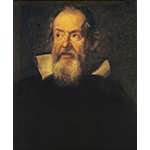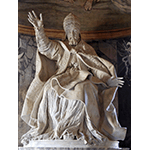Irate theologians (1632-1633)
In Rome a few copies of the newly printed Dialogue dropped into an atmosphere densely polluted by the fumes of the Counter Reformation and intricate political issues connected with the Thirty Years' War. On the international front Urban VIII was subjected to strong pressure from Spain, which felt that its Swedish campaign was inadequately financed from the papal coffers, while on the domestic front the shabby practice of nepotism was becoming ever more visible and attracting ever more opprobium. Feeling himself besieged from without and within, the Pope, now in a state of total insecurity, began a well-aimed purge of his own ranks. One of the first heads to fall was that of Giovanni Ciampoli, a member of the Academy of the Lincei and a close friend of Galileo, who lost his position as Secretary of Briefs to Princes.
Even more toxic was the animosity of the anti-Copernicans, the Jesuits in particular, who, mindful of the derision and stinging defeats inflicted on them by Galileo in the past, 'worked covertly with great energy' to get the work banned. This was reported by Filippo Magalotti to Guiducci, directly quoting what had been told him by Niccolò Riccardi: 'The Jesuits will persecute him remorselessly.' One of the most energetic was probably Scheiner, whose 'canine rage' against Galileo had taken a thousand forms in his Rosa Ursina [The Orsini Rose], a recently published text on astronomy. Already, during his last visit to Rome, Galileo had been the object of malicious gossip and calumny - miraculously ignored at the highest level - perhaps linked to his risky contacts with the Vallombrosan monk, Orazio Morandi, sentenced soon afterwards to life imprisonment for having predicted the death of the Pope; the gossip against Galileo showed a tendency to attribute to him also horoscopes and predictions of death as insolent as Morandi's. After the publication of the Dialogue, no inventiveness was needed to discredit Galileo in the eyes of the Pope; it was enough merely to fan the flames. Even on a quick examination, the Dialogue had aroused his animosity. 'Let the book be held back; without our corrections it must not be circulated,' wrote Father Monster to the Florentine Inquisitor, inquiring also whether the representation of three fish in a circle with the motto grandior ut proles (greater, like my descendants) appearing on the frontispiece was an original witticism of Galileo's. It was not easy to convince Father Monster that this motto appeared on all the books published by Giovambattista Landini. Obviously the printer's mark had incensed Barberini, who read into it an allusion to the easy promotion of brothers and nephews in key positions in the Roman Curia. The Pope was as suspicious as he was infuriated. He had certainly not appreciated the fact that his infallible argument for Divine omnipotence, giving the intellect its quietus, had not, as requested, been the final irrefutable conclusion to the Dialogue, like a gravestone over human aspiration to research, but had been 'put into the mouth of Simplicio, a person … very little esteemed, but, rather, derided and mocked.' In the presence of the ambassador, Francesco Niccolini, he had been able to overlook the personal offence, so inappropriate towards the Pope, but had been unable to control his vexation. Galileo 'had dared to enter where he should not'; in league with Ciampoli he had avoided the obligations imposed on him in exchange for approval, proclaiming a 'doctrine… perverse in the highest degree,' occupying himself indeed with the 'most perverse material that one could ever have in one's hands.' Shortly afterwards Ciampoli was transferred to a mountain village in the Marches. How much his banishment was due to his presumed favouring of Spain and how much to his close ties with Galileo is hard to say. Barberini's obsession with betrayal and plotting and the lack of respect for his opinion had transformed his former adulation into a disappointment much more pernicious to the person adulated than to the adulator.
An order was issued to find and sequester the few copies of the Dialogue in circulation. Tommaso Campanella warned Galileo that a 'congregation of irate theologians', members of various religious orders, was about to meet for the purpose of scrupulously examining the text. 'I fear the violence of people who do not know,' he fretted and, showing a very poor sense of reality, asked the Grand Duke of Tuscany to use his influence to have him enter the commission, along with Benedetto Castelli, as advocates for the defence. Father Castelli, after some attempts at mediation had failed miserably, prudently disappeared, and Campanella, already on the Index for his Apologia pro Galileo [Defence of Galileo] written after the accusations of 1616, went so far as to propose himself for the task of securing the fate of the Dialogue and the safety of its author. Father Monster dismissed this idea out of hand, saying, 'He wrote an almost similar work that has been prohibited, and can in no way act for the defence while he is guilty.' In the end, Campanella was alone when he responded in regard to his unwise support of Galileo's cause, 'If we fail to win, I will be called a beast.' The commission indeed met, unsurprisingly without him, composed only of 'people who did not know': the Pope's personal theologian, a Hungarian Jesuit and Father Monster himself, who displayed friendship and benevolence but, obliged to exonerate himself for the imprudent approval granted to the Dialogue, found himself both judge and judged at the centre of a deep conflict of interests.
After closely examining the Dialogue the commission minutely listed its faults in a written document. The imprimatur from Rome had been affixed to the Florentine edition without any precise authorisation and without the person who had granted it being informed (this exonerated Riccardi). The conciliatory tone of the preface contrasted with the bold assurance of the rest of the work, where the 'medicine of the end' (that is, the conclusive argument imposed by Urban VIII) had been put 'in the mouth of a fool', and so well buried 'that it could only be found with difficulty', and would certainly not be 'approved … dispassionately by the interlocutor.' Frequently heliocentrism was not presented as a mathematical hypothesis but asserted as absolute truth with powerful arguments, while the proofs to the contrary were dismissed as impossible. The structure of the universe was presented not as a presumption, in accordance, naturally, with an Earth-centred system, but was still to be defined. The anti-Copernican authors, regarded as fundamental points of reference by the Church, were derogated. Human intellect was deemed comparable to Divine intellect 'in understanding geometry.' It was stated as true that many Ptolemaics had converted to the viewpoint of Copernicus, and not vice versa. The 'ebb and flow' of the sea, a phenomenon that 'exists', was attributed to the motion of the Earth and the immobility of the Sun, causes that 'do not exist.'
All this, continued the document, could have been corrected, had 'any usefulness in the book' been seen, but there was much more so gravely erroneous as to be uncorrectable. With the publication of the Dialogue Galileo had disobeyed the decrees of the Inquisition issued after the trial of 1616, according to which the heliocentric theory could not be held, taught or defended in any way whatsoever, in either words or writing. It is surprising that the only document known prior to the work of the commission, namely, the letter of explanation sent by Cardinal Bellarmine to Galileo, did not specify the issue with the same degree of precision, but framed, rather, a generic prohibition to hold or defend the concept of the Earth's mobility. Where did the prohibition to teach i t in any way whatsoever, in either words or writing come from?
The seriousness of the situation, it was decided, made it necessary to call in the Inquisition, and the Pope expressed his regrets for this with a deceptive show of compassion. But, on the other hand, Galileo had 'entered a dense thicket of problems, which he could have avoided', dealing with 'disturbing and dangerous matters', which had, moreover, been 'condemned' sixteen years earlier. There was nothing to be done. The Inquisition met soon afterwards. The reading of the commission's document was enough to cause the Inquisition to begin preparing a trial. Galileo was given one month's time to appear in Rome and answer in person for his crimes. Old, in poor health and now terrified also, Galileo sought in every way, through letters of supplication and the intercession of his friends, to avoid the journey. The ambassador, Francesco Niccolini, presented an official request for dispensation, and, at the Pope's sharp refusal explained to him in private that, considering Galileo's precarious health, advanced age, difficulties in travelling and suffering over the severe accusations, he would be risking his life. 'Let him come slowly, borne in a litter, and at his ease,' was the compassionate reply, in the hope that God may pardon him for 'the error of having brought himself into such a difficult situation.' The Pope himself, while still a cardinal, had 'freed Galileo from a similar situation.'
When all hope of avoiding a trial had vanished, Galileo had a physical and psychological breakdown. 'He has gone to bed and is in danger of going more to the other world rather than to Rome,' wrote the Grand Duke's Secretary, Andrea Cioli, from Florence to Niccolini in Rome. Several deferments were requested, supported by medical certificates that painted a gloomy picture (albeit somewhat exaggerated) of the health of Galileo, whose pulse rate was 'intermittent by three or four beats' due to a 'vital faculty hindered and extremely debilitated' in his 'declining age', but probably also due to 'suffering from frequent dizziness, from hypochondriacal melancholy, a weak stomach, wakefulness, pains all over the body', as well as 'a severe fleshy hernia, with weakening of the peritoneum.' The reports, no matter how scientific, were not believed by the Inquisition, whose threat of sending officials and physicians to Florence to 'conduct him to the Inquisition's prison', 'bound in chains', determined Galileo, fearing prison more than interrogation, to leave for Rome. But unfortunately, the one did not exclude the other.
****************************
Texts by Sara Bonechi
English translation by Anna Teicher
Last update 16/gen/2008







